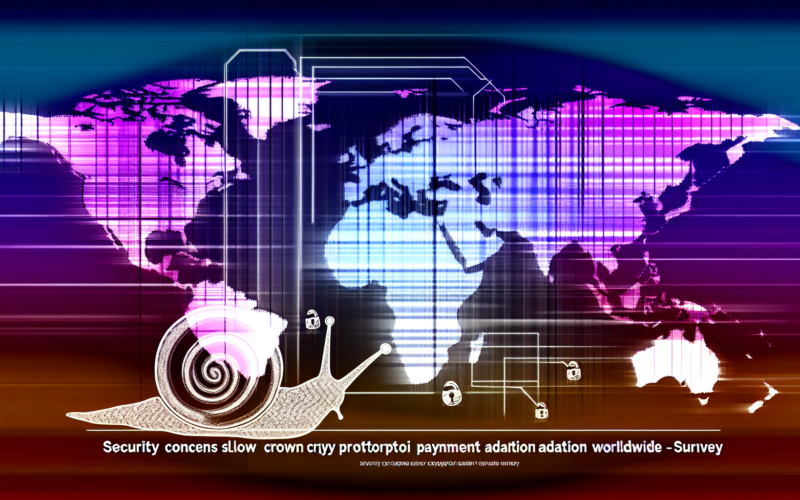Crypto payments face hurdles as 37% cite security as a barrier. Africa & SE Asia lead crypto adoption. Bitget Wallet boosts efforts to ensure safety. #Crypto #Security #Adoption
- Introduction: The Paradox of Crypto Payment Security
- The Evolution of Cryptocurrency Security: From Skepticism to Solutions
- Main Insights on Cryptocurrency Payment Security
- The Challenges of Ensuring Crypto Payment Security
- Future Outlook: What Lies Ahead for Crypto Payments
- Final Reflections on Cryptocurrency Payment Security
Introduction: The Paradox of Crypto Payment Security
In the rapidly evolving world of cryptocurrency, the quest for mainstream adoption of crypto payments is both a challenge and an opportunity. While digital currencies promise speed, efficiency, and lower transaction costs, they are often overshadowed by significant security concerns. According to Bitget Wallet’s latest Onchain Report, a staggering 37% of users identify security risks as the primary barrier to adopting cryptocurrency for payments. This article delves into these security concerns, explores the advancements made to counteract them, and discusses the broader implications for the future of digital payments.
Cryptocurrency payments offer a tantalizing glimpse into a future where transactions are seamless and borderless. Yet, the specter of hacks, phishing scams, and fraudulent activities looms large, casting doubt on the legitimacy and safety of these digital transactions. This article will unpack the current landscape of crypto payment security, the innovative measures being implemented to address these challenges, and what the future holds for digital currency as a mainstream payment method.
The Evolution of Cryptocurrency Security: From Skepticism to Solutions
Early Days: The Birth of Cryptocurrency and Initial Security Concerns
When Bitcoin first emerged in 2009, it introduced the world to the concept of decentralized digital currency. However, the novelty of blockchain technology came with a host of security concerns. In the early days, the anonymity of crypto transactions attracted not only tech enthusiasts but also malicious actors. The absence of regulatory oversight meant that users were vulnerable to hacks and scams.
The Rise of Sophisticated Threats: Phishing Scams and Wallet Poisoning
As cryptocurrencies gained popularity, so did the sophistication of threats. Phishing scams, where users are tricked into revealing their private keys or sending funds to fraudulent accounts, became rampant. A particularly insidious form of attack, known as wallet poisoning, emerged, tricking users into sending assets to addresses that mimic those of legitimate contacts. According to Bitget’s report, these scams cost users over $1.2 million in just the first three weeks of March alone.
Regulatory Responses and Industry Initiatives
In response to these threats, regulatory bodies and industry leaders have made strides to enhance security. Governments worldwide are beginning to implement regulations to protect consumers, while crypto companies are investing heavily in security technologies. Bitget Wallet, for example, has introduced smart authorization detection via its GetShield engine, which scans smart contracts, DApps, and URLs to flag malicious behavior before users commit to transactions.
Main Insights on Cryptocurrency Payment Security
Understanding the Security Risks: A Deep Dive
Security concerns in the crypto space are multifaceted. They encompass everything from the technical vulnerabilities of blockchain networks to user errors in managing digital wallets. One of the key challenges is the irreversible nature of blockchain transactions—once a transaction is made, it cannot be undone. This makes education and awareness crucial for users to avoid falling prey to scams.
The Role of Multi-Layered Protection Mechanisms
To counteract these issues, platforms like Bitget Wallet have prioritized multi-layered protection mechanisms. These include everything from biometric authentication and two-factor authentication (2FA) to advanced encryption protocols. Additionally, Bitget’s $300 million user protection fund serves as a financial safety net, offering compensation in the event of asset loss due to platform-level issues.
The Human Factor: Balancing Usability and Security
While security is paramount, user experience cannot be overlooked. As Alvin Kan, COO of Bitget Wallet, notes, there is a generational divide in preferences. Gen Z users prioritize usability and cost-efficiency, while Gen X users emphasize security. Achieving a balance between these factors is crucial for driving adoption across different demographic groups.
Regional Insights: Adoption Trends in Africa, Southeast Asia, and Latin America
Globally, interest in crypto payments varies significantly by region. In Africa and Southeast Asia, high remittance costs and limited banking access drive interest in crypto payments, with 52% and 51% of respondents, respectively, showing enthusiasm. Bitget Wallet’s simplified onboarding process, which includes non-custodial wallets that do not require traditional bank accounts, is particularly appealing in these regions. Meanwhile, in Latin America, the high transaction costs associated with traditional wire transfers are a significant motivator for adopting crypto payments.
The Challenges of Ensuring Crypto Payment Security
Breaking Barriers: Addressing the Security Concerns
One of the most pressing challenges in the crypto industry is overcoming the perception of insecurity. Despite advancements in security technologies, the industry must continuously evolve to outsmart cybercriminals. This involves not only technological solutions but also fostering a culture of security awareness among users.
The Ongoing Battle Against Cyber Threats
The dynamic nature of cyber threats means that security is a constant game of cat and mouse. As new technologies emerge, so do new vulnerabilities. Companies must remain vigilant, investing in research and development to stay ahead of potential threats. Collaboration between industry stakeholders is essential in sharing knowledge and resources to combat security issues effectively.
Education and Awareness: Empowering Users
Empowering users through education is a critical component of enhancing security. Users must be equipped with the knowledge to recognize scams and understand best practices for managing their digital assets. Initiatives such as workshops, webinars, and online resources can play a significant role in raising awareness and building a more secure crypto ecosystem.
Future Outlook: What Lies Ahead for Crypto Payments
Emerging Trends in Cryptocurrency Security
Looking ahead, several trends are poised to shape the future of cryptocurrency security. The integration of artificial intelligence and machine learning in security protocols is expected to enhance threat detection and response capabilities. Additionally, the development of quantum-resistant cryptographic algorithms promises to safeguard against future technological threats.
The Role of Decentralized Finance (DeFi) in Shaping Security
The rise of decentralized finance (DeFi) platforms presents both opportunities and challenges for security. While DeFi offers innovative financial products and services, it also introduces new vulnerabilities. Ensuring robust security measures in DeFi protocols will be crucial for their long-term success and adoption.
Building a Resilient Crypto Ecosystem
Ultimately, the future of crypto payments hinges on building a resilient ecosystem that can withstand evolving threats. This requires a collective effort from regulators, industry leaders, and users. By prioritizing security, fostering innovation, and promoting education, the crypto industry can pave the way for widespread adoption and trust in digital payments.
Final Reflections on Cryptocurrency Payment Security
In conclusion, while security concerns remain a significant barrier to the mainstream adoption of cryptocurrency payments, the industry is making strides to address these challenges. Through technological innovation, regulatory support, and user education, the crypto ecosystem is becoming more secure and accessible. For users, the key takeaway is the importance of staying informed and vigilant, as the responsibility for security ultimately lies with both the platforms and the individuals using them.
As we look to the future, the potential of cryptocurrencies to transform the financial landscape remains immense. By overcoming security hurdles, the industry can unlock new opportunities for growth and innovation, bringing us closer to a world where digital payments are the norm rather than the exception.











